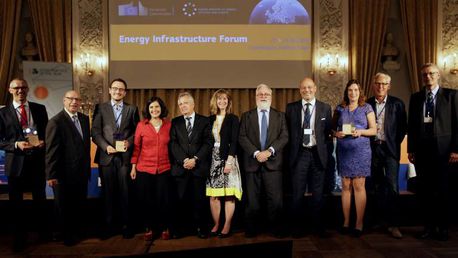

Practices on flexibility, marine ecosystem protection and landowner involvement won the RGI “Good Practice of the Year” award at the Energy Infrastructure Forum in Copenhagen today. Winners collected prizes in the three categories “Technology & Design”, “Environmental Protection” and “Communication & Participation”.
Each of the honoured projects features innovative components or approaches to grid development that set them apart form common practices in their field. They go beyond the ordinary and involve new and unusual technical ideas, consult people apart from the usual suspects or go out of their way to protect species, ecosystems and landscapes while at the same time striving to achieve a climate-friendly energy system with a reliable grid infrastructure for renewables.
The first award of the evening went to Next Kraftwerke for their “Virtual Power Plant Next Pool”, an undertaking that uses cloud-computing technology and decentralised generators to combine the flexibility of both power producers and consumers into a single virtual power plant. The “Good Practice of the Year” jury chose this project as the “Technology & Design” winner because it is an immense asset in the transformation of the power grid. Both supply and demand flexibility will be increasingly necessary to accommodate fast ramping periods and to address corresponding supply forecast errors. “We are happy to receive the ‘Good Practice of the Year’ Award and are excited to see that others share our view on how to design a sustainable and decentralised power system”, Next Kraftwerke Co-CEO Hendrik Sämisch commented on the win.
Read more here.
30 June 2016